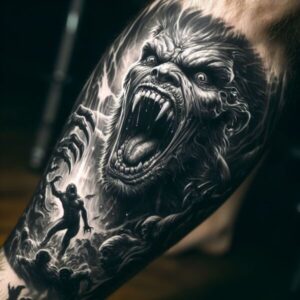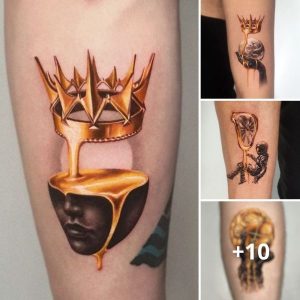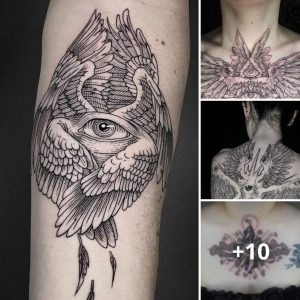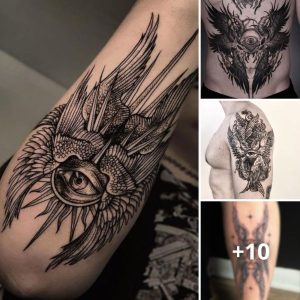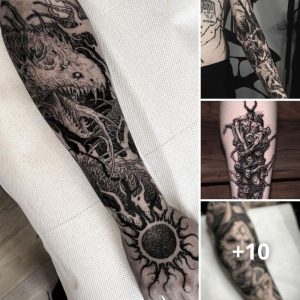In the intricate world of Japanese tattooing, one of the most iconic and enigmatic forms of body art is that of the Yakuza tattoo. These elaborate designs, steeped in tradition and symbolism, have captivated imaginations around the world. In this exploration, we’ll delve into the rich history, meanings, and motifs behind 20+ Japanese Yakuza tattoos, uncovering the fascinating cultural significance behind each inked masterpiece.
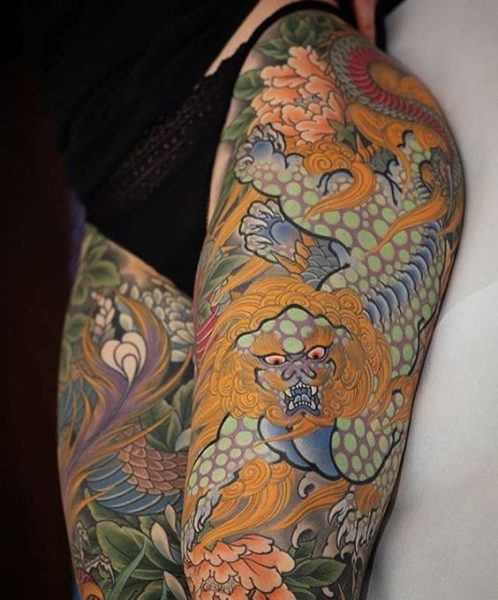
Dragon: The dragon is a powerful symbol in Japanese mythology, representing strength, wisdom, and protection. In Yakuza tattoos, the dragon is often depicted as a fierce and majestic creature, coiled around the body in dynamic poses.
Tiger: As a symbol of courage and ferocity, the tiger is a popular motif in Yakuza tattoos. Often portrayed in full-body designs known as “irezumi,” the tiger represents strength, resilience, and the warrior spirit.
Koi Fish: Koi fish tattoos symbolize perseverance and determination, as koi are known for their ability to swim upstream against strong currents. In Yakuza tattoos, the koi is often depicted swimming upstream, overcoming obstacles in its path.
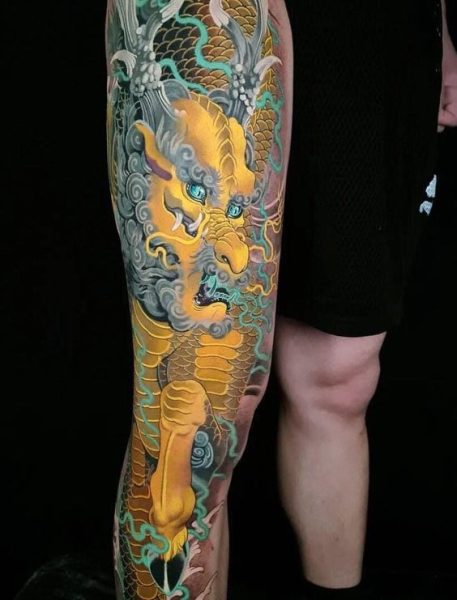
Phoenix: The phoenix is a symbol of rebirth and renewal, rising from the ashes to begin anew. In Yakuza tattoos, the phoenix represents resilience in the face of adversity and the ability to overcome challenges with grace and dignity.
Geisha: Geisha tattoos embody grace, beauty, and femininity. These intricate designs often depict geisha in traditional attire, surrounded by cherry blossoms or other symbols of Japanese culture.
Samurai: Samurai tattoos pay homage to Japan’s warrior class, symbolizing honor, loyalty, and the code of bushido. These tattoos often feature samurai warriors in battle, adorned with armor and wielding traditional weapons.
Cherry Blossoms: Cherry blossoms are a symbol of beauty, transience, and the fleeting nature of life. In Yakuza tattoos, cherry blossoms represent the impermanence of existence and the beauty of living in the present moment.
Peony: Peony tattoos symbolize wealth, prosperity, and good fortune. These vibrant flowers are often depicted in full bloom, surrounded by lush foliage and intricate detailing.
Oni Mask: Oni masks represent demons or ogres from Japanese folklore, often depicted with fierce expressions and exaggerated features. In Yakuza tattoos, oni masks symbolize protection from evil spirits and the ability to overcome adversity.
Fu Dog: Fu dogs, also known as guardian lions, are a symbol of protection and prosperity in Japanese culture. These mythical creatures are often depicted in Yakuza tattoos as fierce and majestic beasts, guarding against harm and ensuring good fortune.
Snake: Snakes are a symbol of wisdom, transformation, and regeneration in Japanese mythology. In Yakuza tattoos, snakes are often portrayed as powerful and mystical creatures, coiled around the body in intricate patterns.
Water: Water is a symbol of purity, life, and the flow of energy. In Yakuza tattoos, water is often depicted in dynamic waves or cascading waterfalls, representing resilience, adaptability, and the ever-changing nature of existence.
Wind: Wind tattoos symbolize freedom, movement, and the power of the unseen forces of nature. These tattoos often feature swirling patterns or stylized clouds, evoking a sense of movement and energy.
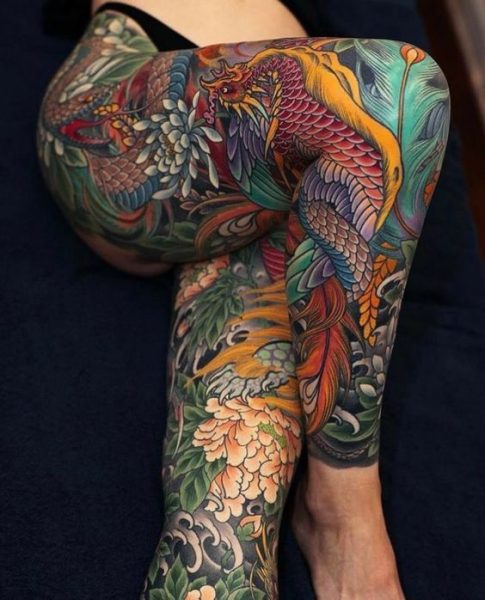
Sakura Branch: Sakura branches, or cherry blossom branches, symbolize the beauty and transience of life. In Yakuza tattoos, sakura branches are often depicted in full bloom, with delicate petals drifting gracefully in the wind.
Lotus Flower: The lotus flower is a symbol of purity, enlightenment, and spiritual awakening. In Yakuza tattoos, lotus flowers represent inner strength, resilience, and the ability to rise above adversity.
Hannya Mask: Hannya masks represent jealous female demons from Japanese folklore, often depicted with twisted expressions and sharp fangs. In Yakuza tattoos, hannya masks symbolize the duality of human nature and the struggle between good and evil.
Skull: Skull tattoos symbolize mortality, the cycle of life and death, and the impermanence of existence. In Yakuza tattoos, skulls are often depicted in elaborate designs, surrounded by flames or other symbols of death and rebirth.
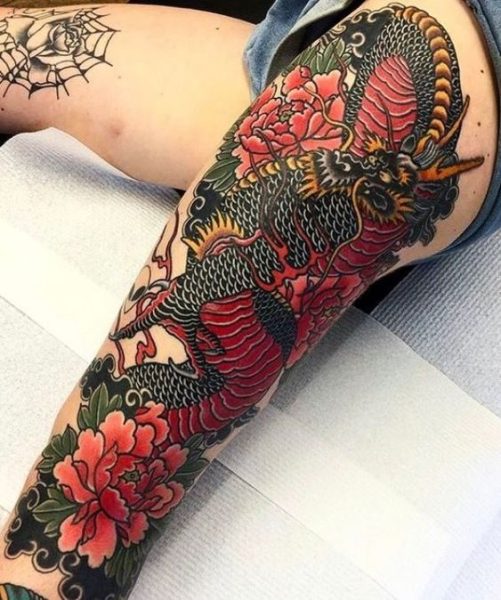
Buddhist Deities: Buddhist deities such as Kannon, Buddha, and Fudo Myoo are common motifs in Yakuza tattoos, representing enlightenment, compassion, and divine protection.
Sword: Swords are a symbol of honor, courage, and the warrior spirit in Japanese culture. In Yakuza tattoos, swords are often depicted as powerful weapons wielded by samurai warriors, symbolizing strength, discipline, and mastery.
Wave: Waves are a symbol of power, movement, and the eternal cycle of life. In Yakuza tattoos, waves are often depicted in dynamic patterns, symbolizing resilience, adaptability, and the ability to overcome obstacles.
Each of these Yakuza tattoos tells a story—a narrative that reflects the wearer’s values, beliefs, and experiences. From ancient myths and legends to timeless symbols of strength and resilience, these tattoos embody the rich cultural heritage and artistic tradition of Japan. As we explore the meanings and motifs behind these intricate designs, we gain a deeper appreciation for the artistry, symbolism, and spiritual significance of Yakuza tattoos.
